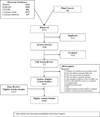Updated systematic review identifies substantial number of retention strategies: using more strategies retains more study participants
- PMID: 26186981
- PMCID: PMC4658250
- DOI: 10.1016/j.jclinepi.2015.04.013
Updated systematic review identifies substantial number of retention strategies: using more strategies retains more study participants
Abstract
Background and objective: The retention of participants in studies is important for the validity of research. We updated our prior systematic review (2005) to assess retention strategies for in-person follow-up in health care studies.
Methods: We searched PubMed, Cumulative Index of Nursing and Allied Health Literature, Cochrane Controlled Trials Register, Cochrane Methodology Register, and Embase (August 2013) for English-language reports of studies that described retention strategies for in-person follow-up in health care studies. We abstracted each retention strategy, and two authors independently classified each retention strategy with one of the themes developed in our prior review.
Results: We identified 88 studies (67 newly identified studies), six of which were designed to compare retention strategies, whereas the remainder described retention strategies and retention rates. There were 985 strategies abstracted from the descriptive studies (617 from new studies), with a median (interquartile range) number of strategies per study of 10 (7 to 17) and a median (interquartile range) number of themes per study of 6 (4 to 7). Financial incentives were used in 47 (57%) of the descriptive studies. We classified 28% of the strategies under the theme of "contact and scheduling methods," with 83% of the identified studies using at least one strategy within this theme. The number of strategies used was positively correlated with retention rate (P = 0.027), but the number of themes was not associated with retention rate (P = 0.469).
Conclusion: The number of studies describing retention strategies has substantially increased since our prior review. However, the lack of comparative studies and the heterogeneity in the types of strategies, participant population and study designs, prohibits synthesis to determine the types of cohort retention strategies that were most effective. However, using a larger number of retention strategies, across five or six different themes, appears to retain more study participants.
Keywords: Follow-up studies; In-person follow-up; Methods; Retention strategies; Systematic review.
Copyright © 2015 Elsevier Inc. All rights reserved.
Conflict of interest statement
Conflict of interest: None
Figures
References
-
- Sterne J, Higgins J, Reeves B. [Accessed 22 October 2014];A Cochrane Risk Of Bias Assessment Tool: for Non-Randomized Studies of Interventions (ACROBAT-NRSI), Version 1.0.0. 2014 Sep 24; http://www.riskofbias.info.
-
- Wells G, Shea B, O’Connell D, et al. [Accessed 22 October 2014];The Newcastle-Ottawa Scale (NOS) for assessing the quality of nonrandomised studies in meta-analysis. http://www.ohri.ca/programs/clinical_epidemiology/oxford.asp.
Publication types
MeSH terms
Grants and funding
LinkOut - more resources
Full Text Sources
Other Literature Sources
Medical




